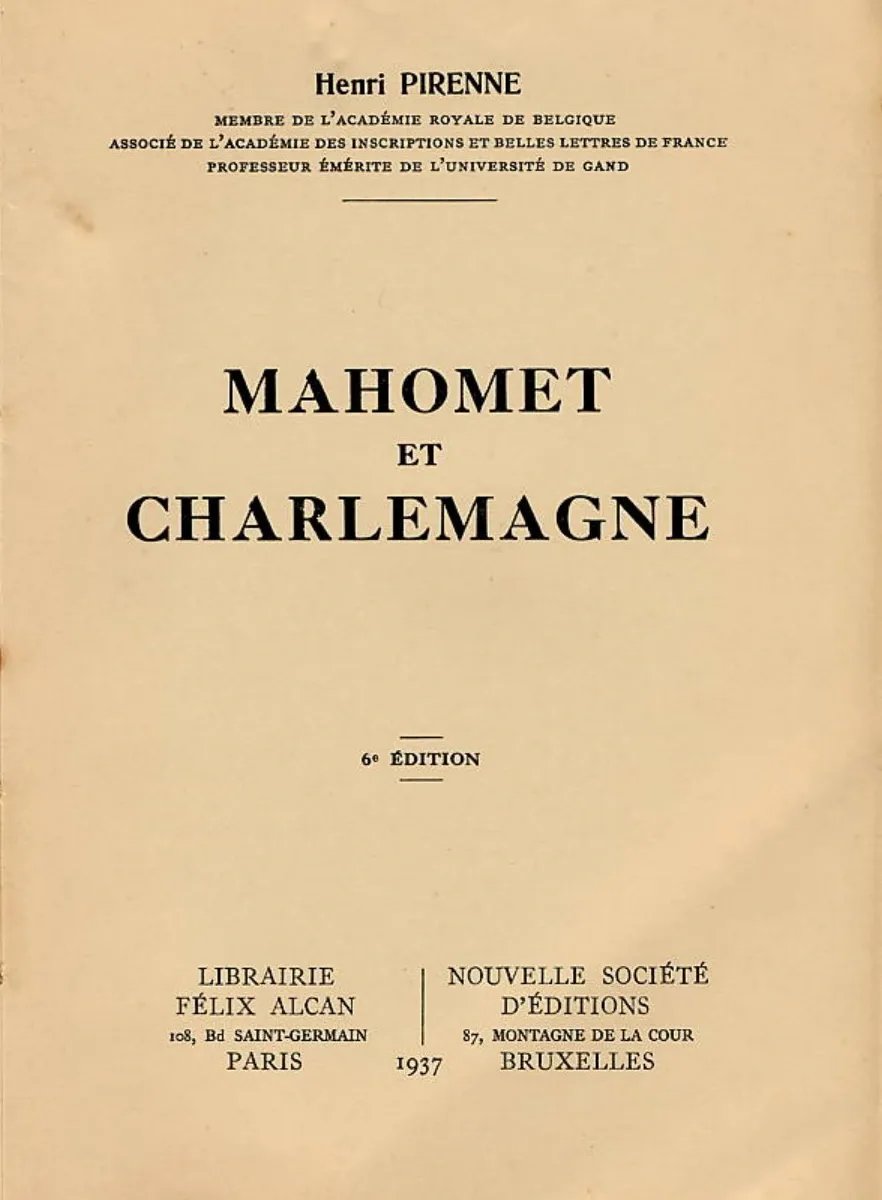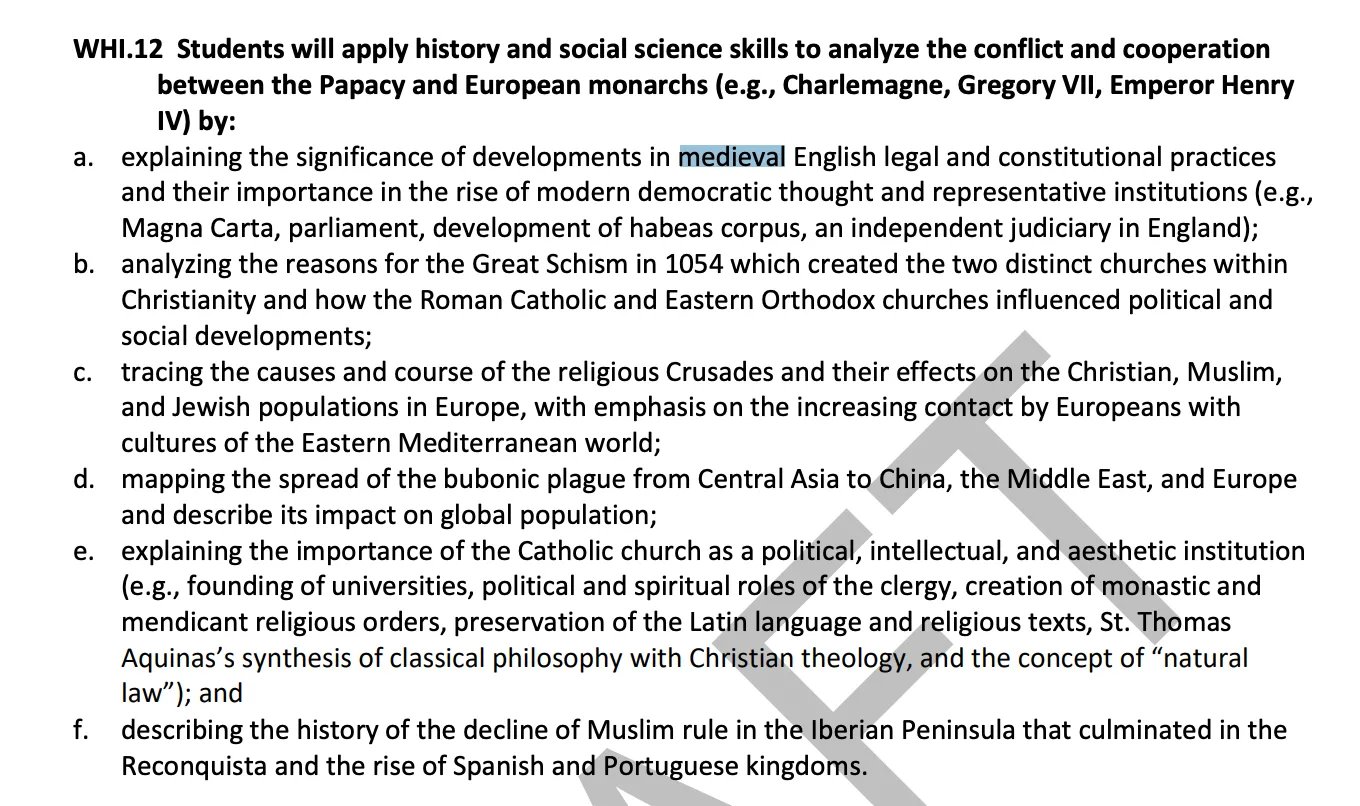Republicans in Virginia Are Going Back to the Dark Ages
This isn’t medieval history; it’s a manifesto.

Modern Medieval
by David M. Perry and Matthew Gabriele
Recently, the right-wing Youngkin administration released a document that severely pared down state standards for history and social studies in Virginia. Criticism has come from all corners, with many pointing out how it whitewashes (almost literally) American history by removing much discussion of the impacts of colonialism/ imperialism and the experience of Native Americans, Blacks, Women, and Hispanics (among other groups). The American Historical Association has even issued a statement urging a rejection of these politically-motivated changes. As David and I have written, bad historical work like this is intended to make a moral point about the present day, not to say anything true about the past. Almost certainly, what Youngkin is doing is continuing a right-wing attack on public schools that launched him to the governor’s mansion in the first place.
What caught my eye as a medievalist was how the standards treat medieval Europe, how retrograde - almost comically so - the Republican understanding of the period is.1
Every 7 years, the VA Board of Education revisits the standards of learning (SOLs). In preparation, under Gov. Northam, the Board began its work. The initial draft standard for History and Social Studies that was sent to the Virginia Board of Education in October was lauded by the AHA (among others) for the thorough and thoughtful work it did. In that document, as has been true for many years, teaching about the European Middle Ages comes in 9th grade under “World History.”
It begins with Rome (WHI.6). There, there are learning outcomes related to the Republic, to the Empire, and to Byzantium as a continuator of Rome (as it was, being the Eastern half of the Roman Empire that survived until at least 1453 CE). Within that is also a section on the rise and spread of Christianity, but emphasizing (as it should) the varieties of religious experience between East and West and between Judaism and Christianity during those first centuries CE. There is no “Fall of Rome” here, but an emphasis on transition and change without the pejorative of something being lost in a “fall.” These are the kinds of age-appropriate standards that nevertheless reflect our best current understandings of the medieval past.
But the new standards collapse all of this, emphasizing the value of empire and suggesting that lax authoritarianism and corrupt Christianity caused its downfall. This is straight from Edward Gibbon, who wrote in the 18th century about the Fall of Rome because he was worried about history repeating with his own British Empire. He mourned a world that had become too “effeminate,” that suffered from “immoderate greatness,” because it had adopted the manners and customs of outside barbarians. And this, that history repeats and our empire will fall soon, is a constant (false) refrain among the political right.
But this isn’t the half of it. I should also note that the Youngkin administration does something rather sly with how it slightly reorganizes some things.
Specifically, they moved the rise of Islam (WHI.7) from the “ancient” world to the “medieval” one. The reasoning behind this, at least, is not from the 18th century but the early 20th - manifesting the work of Henri Pirenne. Pirenne agreed that Rome fell and things got “worse” afterwards but he pushed back the dates until the 8th and 9th centuries, when the Mediterranean world “closed” because of the rise of Islam. Europe is therefore, in this thinking only Christian. But there is no moment in the history of Islam in which it is not a European religion (though it was of course a religion of other continents as well). By placing it in the ancient world, the development of medieval (and hence modern) Europe is dependent on Islam rather than (as the Youngkin administration does) an aberrant strain that’s fundamentally separate and apart.
Finally, the rest of the new standards proposed by the Republicans, as they relate to Europe (WHI.11 and WHI.12), reinforce this reading - that Christianity is the only European religion. No mention of Jews or Muslims. And then a greatest hits of right-wing medievalism - the Crusades, “Reconquista” in Iberia (itself an outdated term that says Europe REALLY belonged to Christians all along), the Black Death, and the importance of the Catholic (big “C”) Church in preserving the West.
As David and I have written in The Bright Ages, these are all ideas with their own histories. But more importantly, placing them together effaces nuance and paints a particular political picture that reinforces white, Christian, authoritarian hegemony. To summarize:
Fall of Rome (WHI.6)
Rise of Islam as medieval (WHI.7)
Separation of East (Islam - no mention of Byzantium, for example) and West (WHI.11)
Christendom in Europe creates cultural order (WHI.12)
Feudalism creates political order (WHI.11)
Crusades (WHI.12)
Reconquista (WHI.12)
Bubonic Plague is China’s fault (WHI.12)
This isn’t medieval history; it’s a manifesto.
The initial Virginia History and Social Studies standards proposed by actual experts recognized that medieval Europe was permeable. Those standards recognized that history flows across time, that there are possible worlds embedded within each historical period.
The Youngkin administration on the other hand is doing what the political right so often does - it starts with the assumption of Western supremacy, and then goes on safari in the past looking for itself. Theirs is a document that takes its history from internet memes, from shitposting 4channers, that wears its bigotry on its sleeve.
To teach a complex medieval Europe - a true version of the past - would be to ignore the Youngkin revisions, and show that the medieval world was filled with both triumph and terror, of roads not taken and possible futures. In other words, to teach a true version of medieval Europe is to recognize how it was as both so different and so much like our own.



Add a comment: